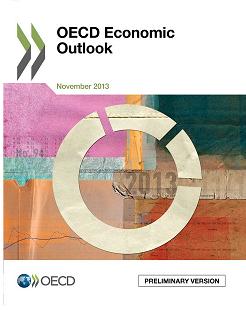Fernandes, S. and Maslauskaite, K., (2013), Deepening the EMU: How to maintain and develop the European social model?”, Notre Europe – Jacques Delors Institute, Studies and Reports 101, Νοέμβριος. Notre Europe – Jacques Delors Institute publishes a study commissioned by the Federal Chancellery of Austria on the impact of the reforms currently implemented or mooted on national welfare states in the EMU. As Jacques Delors underlines in the foreword of …Read More
A bank restructuring agency for the Eurozone – cleaning up the legacy losses
Beck, T. and Trebesch, C., (2013), “A bank restructuring agency for the Eurozone – cleaning up the legacy losses”, VoxEU, 18 Νοεμβρίου. Many Eurozone banks are still in a fragile state following the Global Crisis. This vulnerability will be highlighted as the ECB takes charge of bank supervision, and the EZ moves towards a banking union. This column proposes a Eurozone bank restructuring agency as a way to speed up …Read More
OECD Economic Outlook 2013
OECD, (2013), OECD Economic Outlook, Vol. 2013/2, OECD Publishing. Τhe global economy is expected to continue expanding at a moderate pace over the coming two years, but policymakers must ensure that instability in financial markets and underlying fragility in some major economies are not allowed to derail growth, according to the OECD’s latest Economic Outlook. “The recovery is real, but at a slow speed, and there may be turbulence on …Read More
Central Banks and Financial Stability
Wren-Lewis, S., (2013), “Central Banks and Financial Stability”, Social Europe Journal, 18 Νοεμβρίου. Inflation is significantly below 2% almost everywhere. In the US, Japan and the UK (even though in the UK inflation is still just above 2%) central banks are doing a great deal to get inflation back to 2%. Maybe not enough, but their goal is clear. The ECB is belatedly following the same path (although it remains …Read More
The Role of Financial Stress in the Sovereign Debt-Output Nexus, and in Economic Activity
Schoder, C., Proano, C. and Semmler, W., (2013), “The Role of Financial Stress in the Sovereign Debt-Output Nexus, and in Economic Activity”, EconoMonitor, 18 Νοεμβρίου. Since the outbreak of the euro area crisis, the link between a country’s macroeconomic performance and the level of its sovereign debt has become a central topic in the economic debate. Now, the recent showdown in the U.S. Congress over raising the country’s debt ceiling …Read More
The Jobs Recovery Is Always Two Years Away
Lizoain, D., (2013), “The Jobs Recovery Is Always Two Years Away”, Social Europe Journal, 18 Νοεμβρίου. Is the jobs recovery around the corner? A few week ago, the European Commission published its latest economic forecast. Unemployment in the Euro area is projected to drop from 12.2% in 2014 to 11.8% in 2015. This is seemingly good news. The bad news is that the Commission also predicted that unemployment would begin …Read More
Να αξιοποιηθεί προσεκτικά το διαπραγματευτικό ατού του πρωτογενούς πλεονάσματος
Παγουλάτος, Γ., (2013), Συνέντευξη στη Ναυτεμπορική, Η Ναυτεμπορική, 15 Νοεμβρίου. Τις συστάσεις της Ευρωπαϊκής Επιτροπής στις πλεονασματικές χώρες της Ευρωζώνης, όπως και την «ακαμψία» του Βερολίνου, αναλύει στο naftemporiki.gr ο κ. Γιώργος Παγουλάτος, καθηγητής Ευρωπαϊκής Πολιτικής και Οικονομίας στο Πανεπιστήμιο Αθηνών, διευθυντής στρατηγικού σχεδιασμού επί κυβέρνησης Παπαδήμου. Ειδικότερα για την Ελλάδα σημειώνει ότι το διαπραγματευτικό ατού του πρωτογενούς πλεονάσματος θα πρέπει να αξιοποιηθεί πολύ προσεκτικά εκεί που κατά τη γνώμη …Read More
Public debt and economic growth: There is no ‘tipping point’
Eberhardt, M. and Presbitero, A., (2013), “Public debt and economic growth: There is no ‘tipping point’”, VoxEU, 17 Νοεμβρίου. The idea that there is a common tipping point in the relationship between public debt and economic growth is still widespread. However, this is likely due to a misinterpretation of the existing evidence. Once we allow for the relationship between debt and growth to be country-specific, there is limited evidence supporting …Read More
QE and ultra-low interest rates: Distributional effects and risks
Dobbs, R., Lund, S., Koller, T. and Shwayder, A., (2013), “QE and ultra-low interest rates: Distributional effects and risks”, McKinsey Global Institute, Discussion Paper, Νοέμβριος. There is widespread consensus that the conventional and unconventional monetary policies that world’s major central banks implemented in response to the global financial crisis prevented a deeper recession and higher unemployment than there otherwise would have been. These measures, along with a lack of demand …Read More
The Money Trap
Krugman, P., (2013), “The Money Trap”, The New York Times, 14 Νοεμβρίου. When Greece hit the skids almost four years ago, some analysts (myself included) thought that we might be seeing the beginning of the end for the euro, Europe’s common currency. Others were more optimistic, believing that tough love — temporary aid tied to reform — would soon produce recovery. Both camps were wrong. What we actually got was …Read More





